#i don't think he will get an li
Text
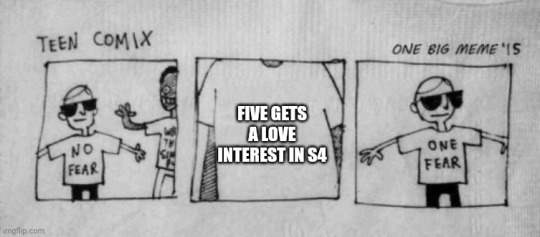
Let that old man retire and live with his family!!!
#i don't think he will get an li#like in order to make it work with his age fuckery they'd have to age him physically#and have someone who's also mentally older than they physically are#but still the idea haunts me#i am a huge aroace five truther but even apart from that I think romance just doesn't work for his storyline#and esp in the last season where they're going to have to bring his arc to an end romance would just get in the way#five hargreeves#number five#tua#the umbrella academy#season 4#s4#tua s4
193 notes
·
View notes
Text
I saw people talking about that scene where Yassen shot Max as a huge betrayal of Alex and it's kinda funny to me like yeah he involved Alex in a murder but also I cannot emphasise enough that Alex decided to join a criminal organisation. People have been telling him he'll need to kill for days now, Alex has watched them kill multiple people already, I get that it sucks for him but you cannot team up with a known killer and be that shocked when actually his secret extra mission was to kill
#alex rider spoilers#alex rider#yassen gregorovich#alex x yassen#alex rider tv#like hot take i guess but actually i don't think he lied to alex when alex asked him about why he was coming#he just avoided the question and said something else that's true (and is part of his underlying reason for coming)#he already told alex he wouldn't just tell him everything like mrs jones might#it's the way yassen has been working for a decade and a half. you get told the essentials and don't ask questions#not answering alex's questions and holding back info/not sharing all the details of yassen's part of the mission is not the same as lying#i mean i guess the real issue here is that alex does not want to kill or be involved in a murder#which is not something yassen and scorpia have ethical concerns about ashdflhs#and is something they have basically told him he'll need to get over already#once again i cannot stress enough that alex is literally surrounded by known killers and teamed up with them
135 notes
·
View notes
Text
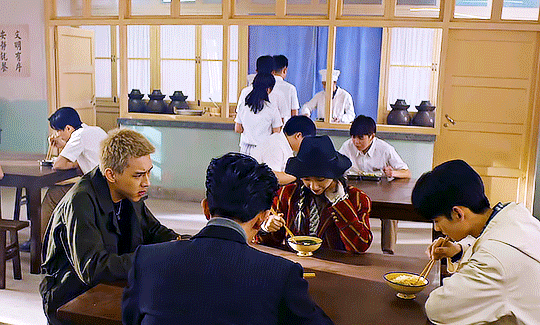
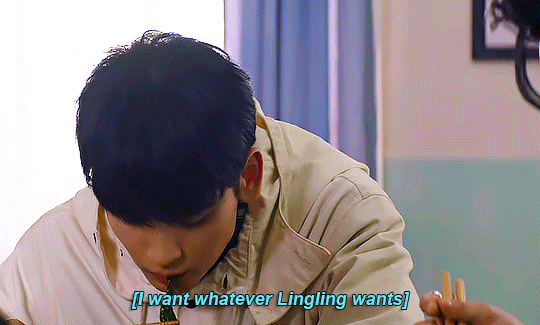








The Spirealm 致命游戏 (2024) | Ep. 26
#the spirealm#致命游戏#kaleidoscope of death#ruan nanzhu#lin qiushi#li dongyuan#zhuang rujiao#xia zhiguang#huang junjie#liu xiaobei#yin rui#cdrama#cdramasource#kodedit#userhanyi#*gifs:mine#xiao zhuang is SUFFERING#consistent coloring who??? i don't know her#i can't get over this arc i keep coming back to it because it's so fun and so much everything#he thinks lingling and his sister *cough cough*HIM *coughoccuoghcoughcough* make a great match#food cw#eating cw
114 notes
·
View notes
Text
OMG Oliver, why did you lie? why did you tell me that your parents were addicts and dealers? that you didn't have siblings? why would you say that your father died? you came to my door crying and telling me a story about how your dad died in an awful way. Why?
Oliver, being completely honest:

#this line always gets me#LIKE WDYM#the worst part is that he's being completely 100% sincere and it KILLS me#IT IS INSANE#like#“i just felt like it was going to be more entertaining if i pretended to be a real charity case”#“and i wanted to be entertaining”#“cause i don't think there's anything else i can give you that has any value to you”#“and all i really want is to be in your presence as long as i can”#“cause what else can i ask from you?”#OLIVER MY GOD#and he's so ashamed too#he's not ashamed of the lies#he's ashamed of confronting how pathetic the truth sounds#like he wants so bady to believe he's not a boy acting out of desperation and love#but he isssss#you're just a boy in limerence#you have NO control#you have NO power#only raw emotion#saltburn#oliver quick#cattonquick#felix catton#oliver x felix#crazy boy ily
79 notes
·
View notes
Text
@esper-aroon has enabled me, so here let me scream at y'all about The Imperial Uncle.

Okay, so I recently read The Imperial Uncle (Huang Shu) by Da Feng Gua Guo from Peach Flower House and I really loved it??? It's first person pov, mlm, about the Emperor's uncle Jing Chengjun, who is mistrusted by everyone simply because of who his parents were and his position, and so he's basically given up on trying to convince people that he's actually a nice, decent person without ulterior motives. He's super trapped by his position, and there's so much he can't say and do, and he's also a hopeless romantic, like, from his own mouth all he really wants is to sleep beside and wake up next to someone who actually gives a shit about him, and even that is basically out of reach in his life. Like, the book starts with his wife (who he has never once had sex with) storming into a meeting he's having and announcing he's a cuckold and she's pregnant.
But also, this poor bastard really thinks he knows what's going on and his very smart. Very unreliable narrator. He's actually kinda a hilarious, impulsive himbo. But the TL:DR is that his loneliness and isolation and the extent to which he's politically trapped routinely lead him to make absolutely terrible decisions.
E. Danglar's translation is absolutely gorgeous, too, and... idk, if you love political plots, melodramatic idiot main characters, a dose of pining, and a slow burn that eventually pays off, come take a look??? (some people think it's a love triangle??? idk, I never really got that vibe, I never felt it was really in doubt which of the two potential dudes he'd end up with, but maybe I only feel that way because I got it right, lmao).
Anyway, I can't stop thinking about how these two idiots end up finally finding each other and getting together, and I have an entire AU in my head (a modern corporate one) and part of another (canon divergent from like a decade before the book starts), and I just want people to love this book as much as I did and scream with me about it.
#unforth rambles#da feng gua guo#the imperial uncle#huang shu#the first au is jing chengjun and li ransi meet and have a fling during a vacation#and then find out that they work for the same company#hijinks ensue#the other is an au that starts with what if jing chengjun's father had actually been accused and convicted of treason#whether he was guilty or not#and his family was sentenced to death#but because jing chengjun is a youth he is instead made into a eunuch and forced into servitude to the imperial family#i know it's a stretch that someone of his stature would be treated that way instead of killed or sold off as a slave#i just don't care#anyway he's given awful jobs at first and they leave him weak and sickly but eventually it because clear he really isn't a threat#and he's allowed to help raise the princes in the next generation including the crown prince#and he also gets to know the other young people around the palace but as a subservient slightly older person#instead of as their elder of higher rank#and then liu tongyi is like okay so everyone thinks you're useless do you want to be a spy for me and help me uncover treason#and he's like FUCK YEAH#and love unfolds from there ofc
92 notes
·
View notes
Text

Mint Eye Yoosung making a reappearance. Despite the red flags in his head, he keeps coming back to MC's quarters since Saeran is usually busy to check up on her.
#um that's just water-- i swear#yoosung joins mint eye bc he trusts V LESS than Rika#Bc to him at least Rika is clear w her intentions despite how horrible they are than V is w his lies#he doesn't really care about the motives of the cult he just doesn't want to think about the future anymore#instead he wants to live for his own selfish intentions along w capturing V#messing w MC is just an added bonus to him joining mint eye#he thinks mc is stupid and easy but v entertaining#he asks her how much does she hate her life to willingly come w strangers to this strange isolated building#yoosung still portrays his good boy persona when he's out and about in order to get ppl into the cult#Saeran was the one who targeted MC first but Yoosung was the one who convinced her to join#i don't have hcs until i start typing in the tags LOL i could go on and on AHAHA#killamonart#art#fanart#mystic messenger#mysme#yoosung#yoosung kim#artists on tumblr
179 notes
·
View notes
Text
The role of Pryce and Carter's Deep Space Survival Procedure Protocol Manual in the characterisation, symbolism, and themes of Wolf 359
TL;DR: The DSSPPM is used as a tool to help establish and develop Minkowski and Eiffel as characters: Minkowski as a strict Commander who clings to the certainty provided by a rigid source of authority like the DSSPPM, and Eiffel as the anti-authority slacker who strongly objects to the idea that he ought to read the manual. The way their contrasting attitudes towards the DSSPPM manifest through the show reflect their character development and changing dynamic. The DSSPPM can be directly used against the protagonists by those with power over them, and the reveal of its authorship gives a particularly sinister edge to its regular presence in the show. But it can be also be repurposed and seen through an individual interpersonal lens.
Note: There’s plenty that you could say about the DSSPPM through the lens of what it says about Goddard Futuristics as an organisation, or about Pryce and Cutter as people. Or you could talk about Lambert quoting the DSSPPM an absurd number of times in Change of Mind, and Lovelace’s reactions to this. But in this essay, I’ll be analysing on mentions of the DSSPPM with a focus on Minkowski, Eiffel, and their dynamic.
“One of those mandatory mission training things”: the DSSPPM as a tool to establish characterisation
The first mention of Pryce and Carter's Deep Space Survival Procedure Protocol Manual (the DSSPPM) in Wolf 359 is also the very first interaction we hear Eiffel and Minkowski have. In fact, the first time we hear Minkowski's voice at all is her telling Eiffel off for not having read the manual:
[Ep1 Succulent Rat-Killing Tar]
MINKOWSKI Eiffel, did you read your copy of Pryce and Carter?
EIFFEL My copy of what?
MINKOWSKI Pryce and Carter's Deep Space Survival Procedure Protocol Manual.
EIFFEL Was that one of those mandatory mission training things?
MINKOWSKI Yes.
EIFFEL In that case, yes, I definitely did.
MINKOWSKI Did you now? Because I happened to find your copy of the D.S.S.P.P.M. floating in the observation deck.
EIFFEL Oh?
MINKOWSKI Still in its plastic wrapping.
This is an effective way to establish their conflicting personalities right out of the gate. Minkowski's determination to "do things by the book - this book in fact" contrasts clearly with Eiffel's professed ignorance about and clear disregard for "this... Jimmy Carter thing”. Purely through their attitudes to this one book, they slot easily into clear archetypes which inevitably clash. Everything about Eiffel in that opening episode sets him up as a slacker who doesn't care about authority, but the image of his mandatory mission training manual floating in the observation deck "still in its plastic wrapping" provides a particularly striking illustration.
By contrast, we immediately encounter Minkowski as a strict leader who cares deeply about making sure everything is done according to protocol; the intense importance she places on the DSSPPM is one of the very first things we know about her. Her insistence on the importance of the survival manual might seem somewhat understandable at first, if perhaps unhelpfully aggressive, but it starts to feel less sensible as soon as we start to hear some of the tips from this manual:
Deep Space Survival Tip Number Five: Remain positive at all times. Maintain a cheerful attitude even in the face of adversity. Remember: when you are smiling the whole world smiles with you, but when you're crying you're in violation of fleet-wide morale codes and should report to your superior officer for disciplinary action.
The strange, controlling, vaguely sinister tone of some of the tips we hear in the first episode is largely played for laughs, emphasised by the exaggeratedly upbeat manner in which Hera reads them. But even these first few tips give us some initial suggestions that the powers behind this mission might not care all that much about the wellbeing of their crew members.
It says something about Minkowski that she places such faith and importance in a book which says things like "Failing to remain calm, could result in your grisly, gruesome death" and "when you're crying you're in violation of fleet-wide morale codes and should report to your superior officer for disciplinary action." (Foreshadowing the Hephaestus Station as the home of immense emotional repression and compartmentalising...) Having those kind of pressures and demands placed on her (and those around her) by people above her in the military hierarchy doesn’t unsettle Minkowski.
Eiffel groans and sighs as he listens to the tips, but Minkowski seems to see this manual as an essential source of wisdom. The main role the manual plays in this episode is to establish Minkowski and Eiffel as contrasting characters with very different approaches to authority and therefore a potential to clash.
When Minkowski demands that Eiffel reads the DSSPPM, he decides to get Hera to read it to him, asking her to keep this as “a 'just the two of us, totally secret, never tell Commander Minkowski' thing”. Eiffel seems convinced that Minkowski won't be happy with him listening to Hera read the DSSPPM rather than reading it himself. This suggests that (at least in Eiffel's interpretation) Minkowski’s orders are not just about her wanting him to know the contents of the manual, since this could theoretically be accomplished just as well by him listening to it. But she wants him to do things in what she’s deemed to be the correct way, to put in the right amount of effort, and not to take what she might see as a shortcut. It’s not just about the contents of the manual; it’s about the commitment to protocol that reading it represents.
“When in doubt: whip it out”: Hilbert’s use of the DSSPPM
In Season 1, the DSSPPM isn't purely associated with Minkowski. Hilbert actually quotes it more than she does in the first few episodes. In Ep2 Little Revolución, Hilbert's response to Eiffel's toothpaste protest is inspired by "Pryce and Carter six fourteen: “When in doubt, whip it out - ‘it’ being hydrochloric acid.”" This tip is absurd in a more direct obvious way than those we heard in Ep1. While this absurdity is partly for humour, it also casts further doubt on the usefulness of this supposedly authoritative survival manual, and therefore on the wisdom of trusting Command.
In Ep4 Cataracts and Hurricanoes, Hilbert starts to quote Tip #4 at Eiffel, who protests "I'm not gonna have one of the last things I hear be some crap from the survival manual". These moments again place Eiffel in clear opposition to the DSSPPM, but also suggest that Hilbert's attitude towards the DSSPPM - and therefore towards Command - is closer to Minkowski's than to Eiffel's.
When Hilbert turns on the Hephaestus crew in his Christmas mutiny, his allegiance to Command is revealed as dangerous. And here the DSSPPM comes up again. As Minkowski dissolves the door between her and Hilbert, she triumphantly echoes his own words back to him: "Pryce and Carter six fourteen: “When in doubt, whip it out - ‘it’ being hydrochloric acid.” Never. Fails." This provides a callback to a previous, more comedic conflict on the Hephaestus, and reminds the listener of a time when Minkowski and Hilbert were working together against Eiffel, in contrast to the current situation of Minkowski and Eiffel versus Hilbert. But it also shows that Minkowski, like Hilbert, is capable of using some of the more absurd DSSPPM tips to defeat an adversary. And it shows Minkowski leaning on those tips in a real moment of crisis.
Once Hilbert has betrayed the crew in order to follow orders from Command, we might look back on his quoting of the DSSPPM as casting the manual in a more sinister light, and again calling into question the wisdom of Minkowski placing such trust in it.
“It's not that I don't believe it, I'm just disgusted by it”: the DSSPPM as an indicator of a changing dynamic
The next mention of the DSSPPM is in Ep17 Bach to the Future:
MINKOWSKI Eiffel's been spot-testing me, Hera. He doesn't believe that I've memorized all of the survival tips in Pryce and Carter.
EIFFEL It's not that I don't believe it, I'm just disgusted by it. I keep hoping to discover it's not true.
MINKOWSKI Well, believe as little as you want, doesn't change the fact that I do know them. And so should you!
I think this provides an interesting illustration of the way in which Minkowski and Eiffel’s dynamic has developed since Ep1. They still have deeply contrasting attitudes to the DSSPPM, but this contrast is now a source of entertainment between them, rather than merely of conflict.
Given that Hera wasn’t aware of Eiffel testing Minkowski on the tips, we can guess that it’s a game they came up with while Hera was offline. In the midst of all the exhaustion and uncertainty and fear they were dealing with after Hilbert’s mutiny, this was a way they found to pass the time. It must have been Eiffel who suggested it; Minkowski cites his disbelief as the reason for the spot-testing. And yet she plays along, responding each time, even though this activity has no real productive value.
Minkowski is keen to demonstrate that she does know the tips and she emphasises that Eiffel ought to know them too, but their interactions about the DSSPPM in this episode have none of the genuine irritation and frustration that they displayed in Ep1. It feels almost playful and teasing. Eiffel still thinks Minkowski is "completely insane" for learning all the tips and is "disgusted" by her commitment to memorising them, but these comments feel much closer to joking about a friend's weird traits than to insulting a hated coworker's personality. It feels like something has shifted since Eiffel responded to Minkowski’s passion for the DSSPPM by saying “I'm so glad that your shrivelled husk of a dictator's heart is as warm as a decompression chamber”.
Another thing to note here is that Minkowski's respect for the DSSPPM has clearly survived Hilbert's Christmas mutiny and Minkowski's resulting distrust of Command. From Hilbert's behaviour at Christmas, it's clear that the crew's survival is not at the top of Command's priority list. But Minkowski still trusts the book that Command told her to read. She still thinks Eiffel should read it too. The main figures of authority above her are dangerous and untrustworthy, but she still clings to the source of guidance they provided her with.
It's also worth noting that Minkowski has not just learnt the advice in each of the 1001 tips, but she has memorised (nearly) all of them by number. If it was just about the information that the manual provides to inform responses to potentially life-or-death situations, then knowing the numbers wouldn't be necessary. Nor would it be particularly useful to know them all exactly word-for-word. Minkowski's reliance on the DSSPPM is again suggested to be about more than the potential practical use of its content. It's about showing that she is committed and disciplined and up to the task of leading. She does have some awareness of the strangeness of many of the tips, but this doesn't diminish the value of her adherence to the manual for her:
EIFFEL You're insane.
MINKOWSKI I'm disciplined. Although I will admit they do get more... esoteric as you go higher up the list.
There's only one tip Minkowski doesn't seem to remember, and that's revealing too:
EIFFEL 555?
Minkowski DRAWS BREATH - and STOPS SHORT. [...]
MINKOWSKI Hold on a second, I know this. (beat) Dammit.
EIFFEL Hey, look at that! Looks like there may be hope for you yet.
MINKOWSKI Quiet, Eiffel. Hera, what's D.S.S.P.P.M. 555?
HERA "Good communication habits are key to continued subsistence. Be in touch with other crew members about shipboard activities. Interfacing about possible problems or dangers is the best way to anticipate and prevent them."
This hangs in the air for a second. Then –
EIFFEL So you forget the one tip in the entire manual that's actually helpful?
MINKOWSKI Shut up.
Communication is a key theme of this show, so it’s interesting that this is the one tip Minkowski can’t remember, perhaps indicating an aspect of leadership and teamwork that she doesn’t always prioritise or find easy.
Eiffel saying “Looks like there may be hope for you yet” seems like just a throwaway teasing line, but it’s got a profound edge to it. A lot of Minkowski’s arc is about learning how to provide her own direction and support her crew outside of the systems of authority and hierarchy that she’s grown so attached to. So perhaps Eiffel is right to see a kind of hope in her failure to remember every single DSSPPM tip – she has the potential to break free of her reliance on external authority.
“Which one was 897, what was the exact phrasing of that Deep Space Survival Tip?”: the DSSPPM in interactions with Cutter
The Wolf 359 liveshow, Deep Space Survival Procedure and Protocol, is literally named after the manual. This suggests, before we’ve even heard/watched the episode, that the DSSPPM will be a key symbol here. Which is interesting because I'd say the liveshow has two main plot points: (a) Eiffel's failure to read the DSSPPM or follow orders in general, the resulting disruption to the mission, and his crewmates' frustration with this; and (b) the looming threat of Cutter, the necessity of keeping information from Command, and the risk of fatal mission termination.
Even without the knowledge that Cutter is one of the co-authors of the DSSPPM (which neither the Hephaestus crew nor a first-time listener knows at this point), there's a kind of irony in the contrast between these two plotlines. On the one hand, Minkowski repeatedly berates Eiffel for not having read Pryce and Carter's Deep Space Survival Procedure and Protocol Manual, which was made mandatory by Command. On the other hand, she is aware that Command in general - and Cutter specifically - represents the biggest threat to the safety and survival of her crew.
Cutter uses the DSSPPM against each of the Hephaestus crew in their one-on-one conversations with him. For Minkowski, he uses it as a way of emphasising the expectations and responsibility placed on her:
MINKOWSKI There are always gaps between expectation and reality, but--
CUTTER But it's our job as leaders to close that gap, isn't it? Pryce and Carter...?
MINKOWSKI 414, yes. Yes, sir, I know.
Cutter knows that Minkowski will know those tips and he knows abiding by them is important to her. She's quick to demonstrate her knowledge of the DSSPPM and agree with the tip. There's something deeply sinister to me about Cutter's use of the word 'our' here. His phrasing includes them both as leaders who should be ensuring that things are exactly as expected. It’s almost a kind of flattery at her authority, but it comes with impossibly high expectations. This way of emphasising the importance and responsibilities of her role as Commander is a targeted strategy by Cutter at manipulating Minkowski, designed to appeal to her values.
In Hera's one-on-one, Cutter uses a DSSPPM tip to interpret her behaviour and claim that he can read her motives:
CUTTER This thing you're doing. Asking questions while you get your bearings.
HERA Sir, I'm just curious about--
CUTTER Pryce and Carter 588: Shows of courtesy and polite queries are an efficient way to gain time necessary to strategize.
Unlike with Minkowski (or Eiffel), Cutter doesn't prompt Hera to demonstrate her knowledge of the manual. That wouldn't work as a power play against Hera, who would be able to recall the manual (or, rather, retrieve the file, however that distinction works within her memory) but who doesn't care about the DSSPPM like Minkowski does. Instead, Cutter implies that Hera’s behaviour can be predicted - or at the very least seen through - by the DSSPPM, which seems like a cruel attempt by Cutter at belittling her.
For Eiffel, Cutter uses the manual as a weapon in a different way again. He asks Eiffel, "which one was 897, what was the exact phrasing of that Deep Space Survival Tip?", something which Eiffel clearly doesn't know, but Cutter of course does. This puts Eiffel on the back foot, trying to defend and justify himself, allowing Cutter to emphasise his position of power yet again.
The DSSPPM plays a double role in the liveshow. On the one hand, as Minkowski reminds Eiffel, proper knowledge of the manual "would've saved [the crew] from these problems with the nav computer" – some of the tips can potentially save the crew a great deal of hassle, stress, and risk. On the other hand, the same manual is used by Cutter to manipulate, unsettle, and intimidate the crew. There are these two sides to the information given to the crew by Command - two sides to the manual which Minkowski still values.
In another duality for the DSSPM, the manual is sometimes used as a symbol of the relationship between the crew members and Command, and sometimes used to indicate the dynamics between the individual crew members, usually Minkowski and Eiffel. Before Cutter’s appearance in the liveshow, Minkowski and Eiffel’s discussions of the DSSPPM reflect interpersonal disagreements between two people with fundamentally different attitudes:
MINKOWSKI Oh come on, why do you think I keep trying to get you to go over these things? Do you think I enjoy going through them?
EIFFEL Yes.
MINKOWSKI Well, alright, I do. But this knowledge could save your life.
Minkowski enjoys rules, regulations, and certainty, for their own sake as much as for any practical usefulness. Eiffel very much does not. This is a simple clash of individuals, in which the link between the DSSPPM and Command is implicit. Minkowski doesn't seem to question the idea that the information in the DSSPPM is potentially life-saving, even though she knows Command don't care about their lives. But Cutter’s repeated references to the DSSPPM remind us who made that book a mandatory part of mission training – it certainly wasn’t Minkowski, even if she’s often the one attempting to enforce this rule.
At the end of the liveshow, in a desperate attempt to prevent mission termination, Eiffel promises Cutter that he will read the DSSPPM (the liveshow transcript notes that him saying this is "like pulling teeth"), an instance of the manual being used in negotiations between the Hephaestus crew and Command. All Minkowski’s orders weren’t enough to get Eiffel to read that book, but a genuine life-or-death threat might just about be enough. Perhaps it's ironic that Eiffel reads the survival manual out of a desire for survival, not because he thinks the contents of the book will help him survive, but because he’s grasping anything he can offer to buy the crew’s survival from those who created that same book.
In the final scene of the liveshow, Minkowski catches Eiffel reading the DSSPPM, and he fumbles to hide that he's been reading it, a humorous reversal of all the times that he's lied to her that he has read it. Perhaps admitting that he's reading it would be like letting Minkowski win. Minkowski seems to find both surprise and amusement in seeing Eiffel finally reading the manual, but she doesn't push him to admit it. There's some slightly smug but still friendly teasing in the way Minkowski says "were you now?" when Eiffel says that he was just reading something useful. In that final scene, the manual is viewed again through the lens of Minkowski and Eiffel’s dynamic – Command’s relation to the DSSPPM becomes secondary.
“The first thing I'd make damn sure was hard wired into anything that might end up in a situation like this one”: the DSSPPM as a tool of survival
In Ep30 Mayday, when Eiffel is stranded alone on Lovelace’s shuttle, he hallucinates Minkowski to bring him out of his helpless panic and force him into action. And this hallucination also brings with it one of Minkowski’s interests:
MINKOWSKI Eiffel... I worked on this shuttle. Reprogramming that console.
EIFFEL So? How does that help –
MINKOWSKI Think about it.
BEAT. And then he gets it.
EIFFEL Oh goddammit.
MINKOWSKI What's the first thing that I would do when programming a flight computer? The first thing I'd make damn sure was hard wired into anything that might end up in a situation like this one?
EIFFEL Pyrce and Carter's Deep Space Survival Procedure and Protocol Manual.
Again, a conversation about the DSSPPM gives us an indication of the development of Minkowski and Eiffel’s relationship. Not only does Eiffel imagine Minkowski as a figure of (fairly aggressive) support when he’s stranded and alone, he thinks about what advice she’d give him and he follows it. Rather than dismissing the manual entirely, he looks for tips that are relevant to his situation. He’s not pleased about his hallucinated-Minkowski trying to get him to read the DSSPPM, but that was what his mind gave him in an almost hopeless situation. Some part of him now empathises with Minkowski’s priorities in a way that he definitely wasn’t doing in Ep1. He thinks that the DSSPPM might be on the shuttle because he knows the manual is important to Minkowski. It’s by imagining Minkowski that he gets himself to read the manual in order to see if it can help him survive – he certainly doesn’t think about what Cutter or anyone else from Command would tell him to do.
In the end, the tips Eiffel picks out aren’t all that helpful or informative: “Confront reality head-on”; “In an emergency, take stock of the tools at your disposal. Then take stock again. Restock. Repurpose. Reuse. Recycle."; and “"In times of trouble, an idle mind is your worst enemy”. But Eiffel does use these tips to structure his initial thinking about how to survive on Lovelace’s shuttle. In an almost entirely hopeless situation, Eiffel finds some value in the DSSPPM. But since the tips he picks out are mostly platitudes, the actual wisdom that allows him to survive all comes from his own mind; the tips, like his hallucinations, are just a tool he uses to externalise his process of figuring out what to do.
“Wasn't there something about this in the survival manual?”: Minkowski potentially moving away from the DSSPPM
Given the significance of the DSSPPM in Season 1 and 2 to Minkowski in particular, it feels notable when the manual isn’t referenced. Unless I've missed something (and please let me know if I have), Minkowski – the real one, not Eiffel’s hallucination - doesn't bring up the manual of her own accord at all in Seasons 3 or 4. This might make us wonder if she’s moved away from her trust in and reliance on that book provided by Command.
Perhaps the arrival of the SI-5, which highlights to Minkowski that the chain of command is not a good indicator of trustworthy authority, was the final straw. Or perhaps the apparent loss of Eiffel - and any subsequent questioning of her leadership approach, or realisations about the valuable perspective Eiffel provided - were what finally broke down her faith in that book.
Alternatively, perhaps Minkowski still trusts the DSSPPM as much as ever, but trying to get Eiffel or any of the other crew members to listen to it is a losing battle that she no longer sees as a priority. Either way, Minkowski’s apparent reluctance to bring up the DSSPPM feels like a shift in her approach.
The associations between Minkowski and the DSSPPM are still there in Season 3, but they are raised by other characters, not by Minkowski herself. The manual is used to emphasise Eiffel’s difficulties when he’s put in charge of trying to get Maxwell and Hera to fill out a survey in Ep32 Controlled Demolition. Trying to force other people to be productive pushes Eiffel into some very uncharacteristic behaviour:
EIFFEL Jesus Christ, what is wrong with you? It's like you've never even read Pryce and Carter! Tip #490 very clearly states that –
He trails off. After a BEAT –
HERA Officer Eiffel?
MAXWELL You, uh, all right there?
EIFFEL (the horror) What have I become?
[...]
Eiffel, now wrapped up in a blanket, is next to Lovelace. He is still very clearly shaken.
EIFFEL ... and... it was like an episode of the Twilight Zone. I was slowly transforming into Commander Minkowski. [...] It was a nightmare! A terrifying, bureaucratic nightmare!
This is a funny role reversal, but it shows us the strength of Eiffel’s association between Minkowski and the DSSPPM, as well his extreme aversion to finding himself in a strict bureaucratic leadership position. It also suggests that becoming extremely frustrated when trying to get other people to do what you want might make anyone resort to relying on an external source of authority, such as the manual. I don’t know whether this experience helps Eiffel empathise with Minkowski, but perhaps it might give us some insight into how her need for authority and control in the leadership role she occupied might have reinforced her deference to the DSSPPM.
In Ep34, we get a suggestion of another character having a strong association between the DSSPPM and Minkowski. After the discovery of Funzo, Hera asks Minkowski what the manual says about it:
HERA Umm... I don't know if this is a good idea. Lieutenant, wasn't there something about this in the survival manual?
MINKOWSKI Pryce and Carter 792: Of all the dangers that you will face in the void of space, nothing compares to the existential terror that is Funzo.
It’s interesting to me that Hera asks Minkowski here. We know from Ep1 that “Pryce and Carter's Deep Space Survival Procedure Protocol Manual is among the files [Hera has] access to”. Two possible reasons occur to me for why Hera might ask Minkowski about the DSSPPM tip here. One possibility is that Hera thinks that retrieving the manual from her databanks and finding the correct tip would take her more time than it would take for Minkowski to just remember the tip. Which suggests interesting things about the nature of Hera’s memory, but also implies that - at least in Hera's view -Minkowski’s knowledge of the DSSPPM is more reliable than that of a supercomputer.
The other possibility is that Hera could have recalled the relevant DSSPPM tip incredibly quickly but she doesn’t want to, maybe because she resents having that manual in her head in the first place, or maybe because she wants to show respect for Minkowski’s knowledge as a Commander. Either way, we can see that Hera – like Eiffel – strongly associates Minkowski with the DSSPPM.
And Minkowski, even if she wasn’t the one to bring up the manual here, recalls the relevant tip immediately. Perhaps she is moving away from her trust in that manual, but everything that she learned as part of her old deference to the authority of Command is still there in her head. She might want to forget it by the end of the mission, but that’s not easily achieved. The way Minkowski’s friends/crewmates associate the manual with her emphasises the difficulty she’ll face if she tries to move away from it.
“One thousand and one pains in my ass”: The authorship of the DSSPPM
In Ep55 A Place for Everything, Eiffel effectively expresses his long-held dislike of the DSSPPM when he comes face-to-face with both of its authors:
EIFFEL What? What the hell are - wait a minute - Pryce? As in one thousand and one pains in my ass, Pryce? (sudden realization) Which... makes you...?
MR. CUTTER (holding out his hand) W.S. Carter, pleased to meet you.
It’s significant that the two ‘big bads’ of the whole series are the authors of the manual which Minkowski and Eiffel were bickering about all the way back in Ep1. It’s not the only way in which the message of this show positions itself firmly against just accepting externally imposed authority and hierarchy without question or evidence, but it does reinforce this ethos.
By being the authors of the manual, Cutter and Pryce have had a sinister hidden presence throughout the show. Long before we know who Pryce is and even before we hear Cutter’s name, their manual is there, occupying a prominent place in Minkowski’s motivations and priorities, and in her arguments with Eiffel. It’s not at all comparable to what Pryce put in Hera’s mind, but it is another way in which these antagonists have wormed their way into the heads of our protagonists.
Minkowski will have to come to terms with the fact that the 1001 tips she spent hours memorising and reciting were written by two people who would have killed her, her crew, and even the whole human race without hesitation if it served their purposes. We never get to hear Minkowski’s reaction to learning the identities of Pryce and Carter, but I think processing the role of their manual in her life will be a long and difficult road that’ll tie into a lot of other emotional processing she needs to do. Her assertion to Cutter that, without him, she is “Renée Minkowski... and that is more than enough to kick your ass!” feels like part of that journey. She doesn’t mention the DSSPPM at all in Season 4. She’s growing beyond it.
"Doug Eiffel's Deep Space Survival Guide": The DSSPPM as a weapon against those who wrote it
Last but not least, I couldn’t write about Eiffel and the DSSPPM without mentioning this scene from Ep58 Quiet, Please:
EIFFEL As someone once told me: "Pryce and Carter 754: In an emergency, take stock of the tools at your disposal, then take stock again. Repurpose, reuse, recycle." And right now? You know what I got? I got this lighter from when Cutter was using me as his personal cabana boy. [...] and I've got myself this big, fat copy of the Deep Space Survival Manual, and you know what I'm gonna do with it? [...]
Eiffel STRIKES THE LIGHTER. And LIGHTS THE BOOK ON FIRE, revealing Pryce just a few feet away from him!
EIFFEL I am going to repurpose it... and reuse it... and recycle it into a GIANT FIREBALL OF DEATH!
And he swings the flaming book forward, HITTING PRYCE ON THE SIDE OF THE HEAD. [...]
EIFFEL That's right! Doug Eiffel's Deep Space Survival Guide, B-
No one other than Doug Eiffel could pull off the chaotic energy of this moment. It doesn’t get much more anti-authority than lighting the mandatory mission manual on fire and using it as a weapon against one of its malevolent authors. It might not be the wisest move safety-wise, and it certainly doesn’t improve the situation when the node gets jettisoned into space. But there is still a powerful symbolism in taking a symbol of the hierarchical forces that have tried to constrain you for years and setting it alight to fight back against those forces. Eiffel takes his own approach to survival and puts his own name into the title, an assertion of his agency and rejection of Command's authority.
The DSSPPM tip that he uses here is one of those he considers when stranded on Lovelace’s shuttle. It’s understandable that after that experience it might have stuck in his memory.
I can’t help feeling that the line “as someone once told me” has a double meaning here. The immediate implication is to interpret “someone” as being Pryce and Cutter – it’s their manual after all – which makes this line a fairly effective ‘fuck you’ gesture, emphasising how Eiffel is using Pryce’s manual against her in both an abstract and a physical sense.
But I think “someone” could also mean Minkowski. Eiffel uses a singular rather than plural term, there’s already an association established between Minkowski and the DSSPPM, and, in Mayday, it’s his hallucination of Minkowski that gets him to read this tip. She's probably also recited this tip to him at other points as well. Under this interpretation, this line is as much a gesture of solidarity with Minkowski as it is a taunt to Pryce. I like the idea that these two interpretations can run alongside each other, reflecting the duality of the use of the DSSPPM that I talked about in relation to the liveshow.
Conclusion
The DSSPPM is a symbol of external rules imposed on people by those with power over them. These rules can be strange, arbitrary, and even sinister, but for those with a desire for certainty and control, like Minkowski, they can be tempting. And they can have their uses, as well as the potential to be repurposed. Attitudes towards these rules provide an effective shorthand as part of Minkowski and Eiffel’s characterisation. And the clash between these attitudes, and how that clash manifests, can tell us something about how the dynamic between those characters develops and changes.
#Wolf 359#w359#Renee Minkowski#Doug Eiffel#Renée Minkowski#I guess I lied when I said I was halfway through at 1000 words#I hope that those who liked my preview post were up for a long read#This is over 5000 words and I still haven't said everything!#You could write a PhD thesis on this#Honestly I feel like this is full of typos and mistakes cos I was kinda tired as I proofread it but I just want to get it posted today#Otherwise I could spend even more time on it and make it even longer... (and also I want it to be out in the world)#But please do lmk if you spot a typo/mistake. I won't be offended#I'd also be interested to hear people's thoughts on any of this#Unimportant point but I'm shaking my head at Minkowski if she wouldn't let Eiffel listen to the DSSPPM instead of reading it#Audiobooks are a valid method of reading. Don't deny a man with ADHD his own approach to absorbing info!#Then again. it might have been an unfounded assumption of Eiffel's that Minkowski wouldn't have accepted him listening to it#I think in school he definitely got in trouble for boasting that he's actually read the book this time when he just watched the film#the empty man posteth
146 notes
·
View notes
Text
geppetto is so bold for bringing up that p hasn't inherited carlo's memories from his ergo as a negative point like that's not the luckiest thing that could've happened to him. can you IMAGINE if that puppet had actually woken up with carlo's full aware consciousness running it.
#lies of p#and here's the thing-- i don't even think carlo would be like... too opposed to him at first. i think he'd be hopeful.#that maybe his death was a wake up call to geppetto. that maybe his father DOES care about him#(of course the fact the puppet is fully carlo's consciousness from the get go wouldn't change a thing regarding his plans.)#that said i do think he'd grow suspicious of geppetto's intentions even before The Obvious Event derails everything#i think he'd notice his father never refers to him by name. or like he thinks of him as carlo.#thoughts....
80 notes
·
View notes
Text
"character who values honesty ending up lying to those he cares about because he's queer in the eighties" will always be a better story than "character never lying not even once because he hates lying" to me
#well done everyone. i like it#this is a draft from late november from when i said will and el lied to mike too what happened to supporting gay wrongs i was like okay#i'll wait a bit. this is enough waiting i feel like#i actually changed the wording so some of my tags that were really good had to go unfortunately#i like mike when he's not the only character who gets to not lie in the everyone lies to everyone season#i don't think anyone likes lying. he's not special#like no matter how you look at it. his ass is not being truthful😩😩😭✋#him being so adamant that he loves el (romantically) in his monologue is well. a lie lmao#byler
299 notes
·
View notes
Text
Loki telling the Avengers he's never had a family before them all and Thor is sitting in the back of the room spitting out his coffee sobbing crying he feels sick to his stomach
#Thor like THEN WHAT AM I????#Loki like YOU'RE LIVING HERE TOO WHAT"S THE PROBLEM????#Thor like you very much had a family you have a family what was Asgard to you the past millennia and a half#Loki like um a fake family i thought we went over that when it was clear they lied to me (and you) our entire lives ?#Thor should feel sick about it actually#I don't think Thor ever Got the fact that if Loki was being disowned/separating himself from the family that includes. their parents.#i don't think he comprehended that if Loki doesn't consider them his parents anymore he wouldn't consider them his parents anymore#i think Thor just assumes it's symbolic or something or that inevitably Loki will get over it and come back btw#i think that should happen if post-Avengers 1 Loki is banished to Earth#and I think Thor should actually be upset and feel sick aobut it#i think Thor didn't understand that being lied to hurt Loki even when he watched Loki let go on the bifrost
107 notes
·
View notes
Text
I love how despite the party trying to shake the secrets out of Colin, no one has made an Insight check against anything he’s said about himself yet, which means that technically, nothing he’s said actually has to be true. It doesn’t mean it’s not, but if it wasn’t, who’s to say?
#dimension 20#the ravening war#dimension 20 spoilers#the ravening war spoilers#the perks of being a very low charisma character who keeps claiming to have no secrets#is that everyone assumes you won't bother lying because you're so bad at it#meaning that technically; as long as it's not an outlandish lie; you could get away with a lot of little lies and evasions#even if people know you're being evasive or secretive; they probably won't think you're outright lying because why would you bother?#for the record: i don't think colin has outright told a lie but just been very selective and general with what parts of the truth he shares
162 notes
·
View notes
Text
ppl be like "knkdz is abusive bc knkd is mean to dazai when dazai canonically struggles with mental health and is suicidal and blah blah blah :(" and then turn around and ship skk with their full chest as if their dynamic isn’t based entirely on the fact that they canonically genuinely hate each other-
Like? U can dislike characters all u want - go ham - hate them for no reason even but u don’t have to lie and mischaracterize and be a massive hypocrite abt them idk
#like??#make it make sense at least damn#I irrationally hate certain characters Just Bc I Don't click with them but thats entirely on me#I don't start yapping abt how they do X Y Z things bc thats not true- I just don't like em#no need to spread lies jfc#u can dislike kunikida just cuz...#u don't need to justify it... ppl are allowed to Just Not Like Things -#everyone is canonically mean to dz - thats just their thing#and dz canonically enjoys pushing Kunikida's buttons and getting him upset???#if dz really was bothered by it u think he would let it slide?
40 notes
·
View notes
Text
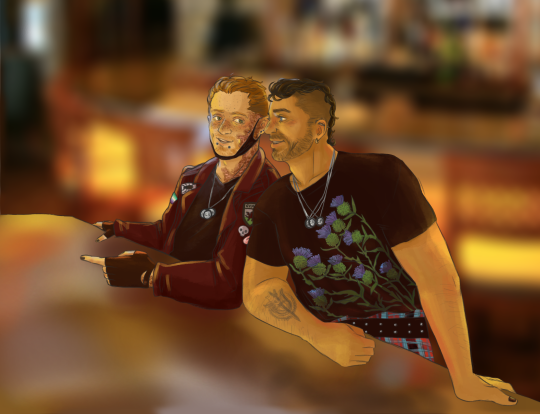

I wanted to try and find my headcanon of Roach's face because for some reason my brain decided that I couldn't keep writing my fanfic if I didn't know what I wanted him to look like beneath his mask... So obviously the full picture wasn't planned. (Also I went the easy way for the background because I remembered that I wasn't getting paid anyway so why make myself suffer)
I don't know if the design is definitive, but I find him cute. I made him Welsh, because why not. He can bond with Soap over why the fuck do the English exist.
Anyway they're gossiping about someone at the pub like the little shits they are. Also I don't know if it's obvious or not, but Roach has the mask sun-tan line. Ghost does too. Speaking of Ghost, he's on the other side of the table, looking like that :

#cod mw2#john soap mactavish#gary roach sanderson#simon ghost riley#soaproach#ghostsoaproach#ghostsoap#soapghost#they each have one dogtag from the other two (they lied about having lost the first pair to get another to have enough)#but they only wear the three when they're not on duty for obvious reasons#also i feel like not enough people know that british dogtags are round and not rectangular like the american ones#soap wears a kilt because kilts are hot and with his shirt it looks kinda punk i think#thistles are the flower of scotland btw (and one of my favourite flowers they're so pretty)#the piercings also don't stay on when they're on duty because of the risk of injury#ghost isn't listening to the conversation at all - there's too much noise to focus anyway and his bfs are way too pretty#my headcanon about roach is that he's not completely mute (after all he talks when he appears in the comics)#but he still goes non-verbal when he's overwhelmed or with people he doesn't like (out of spite) so he knows bsl#sorry if the text and the tags are a mess i can't remember the last time i slept#roach's hair is styled because they're on a date - it's usually a mess he has constant bed hair#look at that i remembered how to draw i'd be proud if i wasn't barely there lmaoo#it's my first time drawing burn scars but i think it's recognisable? maybe?#my phone makes it look way more yellow than my computer and i don't know which one is wrong so rip lmao too bad
259 notes
·
View notes
Text
I think it says a lot, as a lesbian, that I prefer Ryder Wilson over Kit Jackson, and Kit is goc.
#Not attracted to Ryder romantically or sexually#So don't get it twisted#I just think he's a better person#More well rounded individual#With personality#And that's without taking his diamond scenes#It just shows that gender locked LIs#Are usually better written than goc LIs#USUALLY#UB is sooo much better than UT#choices#pixelberry#playchoices#ub#unbridled: an untameable story#choices unbridled#ut#Untameable#Kit Jackson#ryder wilson
26 notes
·
View notes
Text
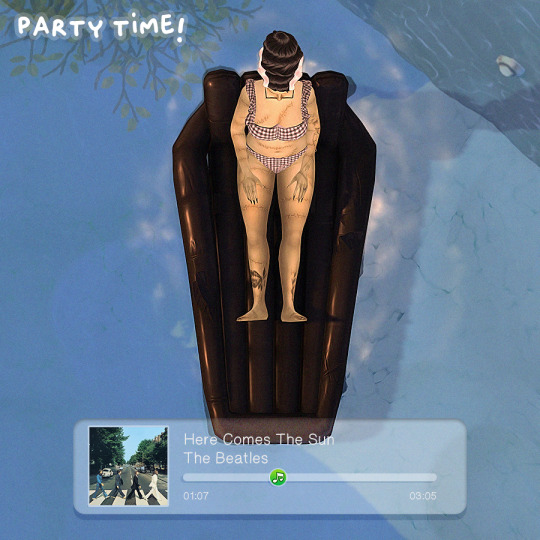






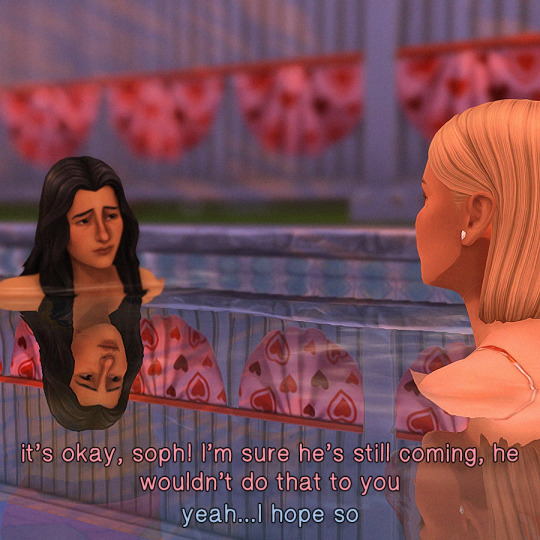

it's time for the love day party! everyone is having a great time except for Sophia :( Anthony said he'd be there but he hasn't shown up or responded to her texts
previous // next

okay raven 👍
#tjolgen1#i love the pics from the party sm#theres one more post from it#i just think they are so cute and I love seeing everyone together#seb see's charlie for the first time since being turned and the first thing he does is PRETEND TO BITE HIM#he did that autonomously too 😭😭#its okay right after seb got the 'im so glad you don't think my llama jokes are getting old' sentiment which was so cute#thats such a them thing to do#ts4#ts4 legacy#sims 4#sims 4 legacy#tjolc#save: tjol#tjol: elowen brady#tjol: sebastian stein#tjol: raven stein#tjol: lucien stein#tjol: xylithe vega#tjol: charlie clark#tjol: anong jackson#tjol: hua li#tjol: marjan shabani#tjol: sophia brady
30 notes
·
View notes
Text
ramblings on Li Ming (and Heart) and homosexuality
moonlight chicken has so many things to offer in terms of technical beauty and interesting themes but what i cannot stop thinking about is the different ways they approach homosexuality in the story.
we have Wen who has a rainbow flag on his desk and pictures of him and Alan on the wall. Wen, who openly flirts with Jim and has no qualms talking openly about his one night stand. Wen, whose step father knows about his sexuality and is close enough with him to discuss his love life.
Kaipa we don’t know too much about. But his mom knows and is supportive and some of the vendors and the chicken family seem to know. But if anyone was questioning in what reality this show is set with all the class discussion and corona featuring, his part of the story shows that homophobia exists and he is worried about how he fits in with his own family, the expectations of his mother and possible the awareness that he makes the family he has “different”.
Jim is arguably even more visibly gay than Wen in terms of what we see throughout the show. He opened the shop with his ex, they prayed at the temple together and even though he objected due to proprities sake eventually they loudly declared their love to each other and the whole neighbourhood knows. Wen somehow feels like he is living in the remnants of a bubble: his circle of friends seems very queer, his closest friend and the whole gym seem to be all part of that as well. This only might change now with him questioning his work and breaking up with Alan: some gatherings he won’t attend anymore apparently.
And finally, we have Li Ming. At school he doesn’t seem to open up to his classmates on most things and additionally is in the closet. While there wasn’t anything alluding to homophobic rethoric being spread at school we can see how the heteronormativity gets to him and feel that there must be good reason as to why no one knows. And it could just be how Li Ming is judging the situation based on vibes, we don’t know. His mother is or at least was homophobic but at the same time he is raised by his gay uncle who is surrounded by other gay people. And I love how it feels like this might have given him enough security to be comfortable with his own sexuality but how it also isn’t enough to shield him from the world at large.
With so many great shows coming out of Thailand and most of them getting more and more political it just feels so real and 2023 to me that Li Ming is part of a generation that knows who they are but still have to battle with the shadow that homophobia has cast way before they were born.
#moonlight chicken#i had this in my draft for a week now thinking if i'd get the time i could put this more leloquently but that was a lie as it turns out#might edit some stuff later#but for now i just have to write about how fantastic this show is for giving these varied realities of queer life#which are all influenced by their environment but also in the way the characters connect across generations#we don't know if him had a gay mentor who could've guided him#whereas li ming technically has him and his neighbourhood friends to reference#but li ming - understandibly so - seems more closeted than anyone else (minus Heart possigly)#in middle school everyone around me proclaimed how supportive they were of lgbt+ rights#but as soon as one guy came out he become the TALK of the school for weeks#he got reduced to his sexuality#and when he dated a girls some months after he got called attention seeking for coming out as gay before#and most people thought they were doing an open-minded thing#and despite knowing that i know that i am not the only queer kid who decided to not come out lest we'd become that talk of the whole school#and our dating lives scrutinized#even though all of us were super comfortable with who we are#and for me that was mostly the case because i had adult lesbian role models close to my family#so i knew i was good and that nothing strange was going on#but still - this othering made the school environment hostile enough to keep me in the closet#so yes - i am extremely delighted with how they depict this dynamic with li ming
182 notes
·
View notes